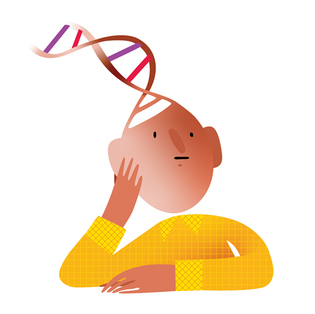
Alex Eben Meyer
Personality traits have long been an object of scientific fascination. From one of the first definitions of personality types in ancient Greece—where Hippocrates linked various temperaments to bodily fluids—to the development of personality tests to predict battle resilience during World War I, researchers across many disciplines have tried to pin down the elusive roots of personality.
Now, geneticists are jumping into the fray. Researchers like Daniel Levey, an assistant professor of psychiatry at the Yale School of Medicine, are investigating whether aspects of personality may be encoded in DNA. Levey’s previous research has dissected the genetic underpinnings of psychiatric traits such as anxiety and depression, and personality traits are a natural extension to him. “Understanding what genetic influences affect personality can help us understand how personality traits might affect risk of psychiatric disorders,” he says.
In a study recently published in Nature Human Behavior, Levey’s team scoured the genomes of more than 200,000 volunteers in search of genetic differences that correlated with personality traits. Study participants completed a survey designed to assess the “big five” personality traits—neuroticism, extraversion, agreeableness, conscientiousness, and openness—and researchers compared these scores to the volunteers’ DNA sequences.
The researchers found hundreds of genetic sequences linked to personality traits—mostly to neuroticism—including the first-ever genetic link to agreeableness. Some of the top genes play a role in the brain. For example, Levey linked differences in CRHR1, a gene that encodes a brain signaling protein, to both neuroticism and extraversion. Previous studies have also linked CRHR1 to depression.
The genes’ effects, however, were quite small—so don’t expect that a tiny change to your DNA would dramatically change your personality. “This is not fate,” Levey says. Other factors in a person’s environment and lived experience also play important roles in shaping their personality, he says.
Levey was able to link some of the personality-associated genes to biological processes, even identifying cases where genes might contribute to risk of a psychiatric disease or be affected by psychiatric drugs. For example, neuroticism seemed to both cause and be caused by depression and anxiety, although Levey says more investigation is required. “We hope that when we integrate this information with other psychosocial factors, it provides a more complete picture,” says Levey.
 loading
loading